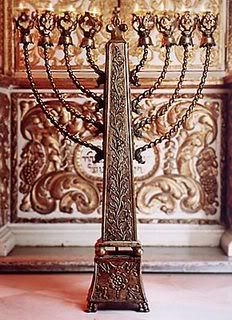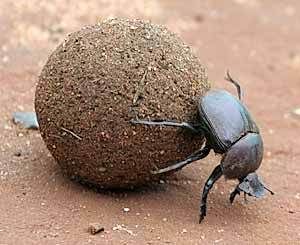
“If you reveal your secrets to the wind you should not blame the wind for revealing them to the trees.” (Kahlil Gibran, 1883 - 1931)
In my early years, we lived next door to an elderly couple. I think Mr. K was a retired accountant, but I cannot be entirely sure. Mrs. K baked cookies and exchanged minor pleasantries with the neighborhood yentas. They were a quiet and not overly social couple, but everyone adored them. Mr. K davened in my father’s shteibel and I think his son was a Rov somewhere in Europe, but I have no idea which country. Mrs. K spent a good deal of time reading, and on occasion would exchange recipes and the latest news of her eyniklach with my bubbe. I don’t remember if they were Poylish or Russish, but their children were all hard-core Misnagdim. If the Ks themselves had any philosophical or religious issues with their chasidishe neighbors, they kept it a very well guarded secret.
The outer appearance of the K’s house was exactly like ours in almost every respect. Most homes in that section of Brooklyn look a lot like dominoes stood close enough alongside each other so that if, one was so inclined, one could level the entire block with a gentle nudge. The one noticeable difference was their backyard. Our yard fell under the relentless dominion of my father; a man predisposed to maximizing every inch of available real estate for something purposeful and hopefully, edible as well. I do miss his garden, with the smell of ripened tomatoes, stalks of dill, fresh peas, and a few varieties of flowers sprouting up in between the rows. Despite all the kvetching and yammering I did when having to perform of the heavy labor, as my father’s arthritis was already very painful for him, I still came to miss those times later on in life. I very much enjoy gardening myself, but I lack the natural expertise for which my father, in his small circle of friends, was well known.
The K’s yard, unlike our own, was quite bare; with its sole discerning feature an overgrown scrub tree that miraculously projected itself sunward through a large split in the crumbling pavement behind their garage. As the tree grew and its trunk expanded, it gradually dislodged more and more of the cement around its base. There were huge chucks of broken concrete that appeared to have been placed around that tree by human hands; perhaps in an attempt to protect it from urinating dogs or passing cars. Since I had never given it much thought back then, I never measured its exact height. When perched upon the highest branch to which I could reach, looking out and over our garage and down into the alleyway behind the street was pretty easy. Though not an overall scenic or even useful view, I nonetheless felt a sense of power in being able to survey the neighborhood from above the street level.
The first instances of my interaction with this tree began at approximately four years of age. I honestly cannot say what I did in or around that tree that first time. If I was anything like other kids, which is highly unlikely, I was probably skipping around aimlessly, picking off the lowest of leaves and then releasing them into the passing breeze, carelessly watching them flutter earthward from my fingertips. I recall other occasions, much later on, when I would take a sefer or a drawing pad and squat under that tree and read for what seemed to be hours on end. As I got a little older and my tuchis a bit more sensitive, I placed a plastic milk crate on the ground beneath it. Eventually as I was able to climb higher up into the tree, I found a good sturdy branch, and with feet dangling, I would read, say tehillim, and sometimes ‘zone out’ while staring out into no place in particular. If I was nowhere else to be found, my bubbe always knew to check for me in the tree.
Other than the occasional stray cat, bird, or curious squirrel, the tree was my exclusive lair. I cannot recall one instance where I came home to find another human occupying my tree. It was my sanctuary. The K’s eyniklach, who must have lived some distance away, seldom visited, and when they did appear ex nihilo, never ventured out into the yard. The Ks never bothered to put up a swing set or jungle gym, so the yard’s nonconformity to modern childhood usefulness was evident. I did invite a few of my chaverim to enjoy the shade or engage in some gratuitous climbing exercise, but there were no takers. I began to imagine that HaShem placed the tree in the “midst of the Garden” just for me and even He did not want anyone else using it.
When I say that the tree served as a sanctuary, it is no exaggeration. That was my personal refuge from my father’s sullenness, my bubbe’s nosiness, and my own intellectual boredom. But, most of all, I was there to escape a graying pall of sadness that engulfed our home when my step-mother was diagnosed with terminal yenne-machalah and spent her last several months of life in a cancer ward. The poetry I wrote for her, when weather and time permitted, was conceived under the low hanging, and serrated leaves of that incredible tree. If I could have those daydreams back now, I could write my entire life away, and even if doing little else, never complete even one of those childhood afternoon’s cerebral meanderings.
Wintertime was a little tough for me because the tree shed its leaves and the naked limbs no longer served to shade and comfort as they had all summer. I was somewhat consoled in the knowledge that springtime was coming again soon and soon enough my precious tree would return to its blossoming green splendor. I remember a teacher telling us that “Trees need to rest, too”, so I was not too broken up about a forced wintertime hiatus in our friendship. As it was, I did not go near the tree on Shabbos or Yom Tov anyway, and as I got older I was sometimes just too busy to get anywhere near it. I never, however, forgot about that tree, even in the dead of winter. I thought the tree had to be cold out there without its mantle of leaves.
Mrs. K was always worried I would fall and break something on their property. Mr. K referred to me once as the “shimpanze”, but never shooed me off. I think he was being paid off in fresh tomatoes from my father’s garden, and didn’t want to disrupt his ‘vegetarian’ good fortune of living next to a compulsive urban farmer. Besides, I was never any trouble. Other than leaving a chumash out in the rain once and failing to retrieve some pages that had fallen from my sketchpad, there were no behavioral or disciplinary issues surrounding my occupation of Mr. K’s scrub tree.
One my early talents, other than writing, was watercolor painting. I never took any classes, nor was I even encouraged, as religious kids know, to become an artist. I was just plain good at it. In fact, my father, who never claimed pride in any accomplishment or success I achieved, framed every single one of those crude paintings. It was the only art on our walls. In the center of our dining room wall hung a watercolor portrait of that tree which, in my estimation, was a real work of love. It is unfortunate that the fire, which took not only my father’s health and happiness, also destroyed those paintings. Though I had long since given up any artistic ambitions, it would have been nice to look at that tree again, even if only through the eyes of an eight-year-old aspiring impressionist.
I clearly remember Mr. K’s levaya, Mrs. K saying goodbye to my Bubbe, and their house going up on the market. Everyone wondered who would move in, but we were fairly sure it wouldn’t be empty for long. As children, we have this naïve sense that good things last forever and I, giving no real thought to the possible demise of my beloved tree, went on with daily life as if nothing had changed. I was still able to visit at my leisure and, having never imagined otherwise, assumed that the new owners of the K residence would not mind one bit if I continued hanging out in their back yard.
When my stepmother o’h passed on, the family had already prepared for the worst-case scenario. We all knew she was sick and becoming sicker by the day with no hope of recovery. We knew there were operations, surgeries, and medications. I knew, just by seeing her that her life was slowly leaving her. As a child, I didn’t process what all of that meant as an adult would know it to imply, and because of that, I may have seemed cooler and more distant from her passing than I would otherwise. I may have been in shock. My father suddenly got much older, and the sympathies of neighbors and family that poured out to us confused me and pushed me further into a desire for solitude. It seemed there was nothing that I could rely upon to always be there for me. Nevertheless, my tree was still there; taller and much leafier than last year, and still willing to tolerate my daily sojourn beneath its branches. That, too, was soon to end.
One Erev Shabbos, when I was probably eleven years old, while on my way home from the bakery, I decided to stop by the tree for a few minutes and maybe to have a cookie or two and ‘hang out’ under my tree. I distinctly remember strolling along with an unconscious, carefree sort of gait; the sort that children use when they aren’t hurried by adults or worried over mundane childhood concerns. I stepped through the K’s gate without a thought, expecting to see my beloved tree as always. However, all that remained was perhaps eight inches of stump and a pile of broken cement, having been pulled back from the trunk to allow easy access for the chainsaw. At first, I really thought I had walked into the wrong yard and I looked around to make sure I knew where I was. To the left were my father’s green beans dangling between the spaces of the chain link fence and the smell of dill carried on the summer breeze. My tree was gone. Just like that.
I cannot remember if was angry, shocked, sad, numb, or all of the above and more. I do very specifically recall wondering why anyone would cut down a tree that never hurt anyone or did not seem to obstruct anyone’s path. Did someone need firewood? What kind of mamzer would do that to my tree? I was also curious as to why my father, whom I thought must have known that someone going to murder this tree, did not protest its violent execution by running out and shouting “Wait! Stop! That is my Shloyme’s tree!” I felt hurt, abandoned, and betrayed. The tree had always been there, it seemed, and it never asked anything of me or objected to my presence. I loved the security the tree offered and now it, like other things I loved, proved as temporary and fleeting as those turned out to be. That sudden change of scenery awakened a deeper sense of insecurity; injury added to the stinging insult of being left unawares. I was the only one who cared about that tree and nobody bothered to ask my opinion! The tree no longer existed and, as far as humankind was concerned, apparently neither did I.
It’s been thirty-six years to date since my tree o’h was cut down, limb by limb, and chipped up into mulch. As I recall, this was among the worst acts of senseless, meaningless violence I have ever witnessed. I haven’t been back to the yard on C Street, nor have I really wondered too much what the new owners replaced my tree with, if anything. I suppose there have been quite a few alterations to the landscaping since then. I moved on and forgot about that tree, my good friend, for a while, but every so often I am reminded of those times and the peace I enjoyed under its branches. Things change and we change along with them, but memories good or bad, are not so bad to cherish.
I still miss that tree. I felt very much alive then. I think Maybe there is still some grieving to do. Maybe I just need another tree.
(In writing, I try to offer some lesson in the hope of bringing a closure to a question or inspire readers to think from a new perspective. There are no such noble intentions here. I could go on about ‘not taking things for granted’ and other redundant platitudes; but that would be overstating what is already glaringly obvious to anyone. This was just a story about a disappointed daydreamer, a scrub tree, and the insecurity that came with being unprepared for inevitable changes.)
Kol Tuv













